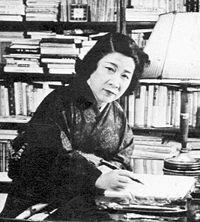
Fumiko Hayashi (author)
Encyclopedia

Japan
Japan is an island nation in East Asia. Located in the Pacific Ocean, it lies to the east of the Sea of Japan, China, North Korea, South Korea and Russia, stretching from the Sea of Okhotsk in the north to the East China Sea and Taiwan in the south...
ese novelist and poet
Poet
A poet is a person who writes poetry. A poet's work can be literal, meaning that his work is derived from a specific event, or metaphorical, meaning that his work can take on many meanings and forms. Poets have existed since antiquity, in nearly all languages, and have produced works that vary...
.
When Hayashi was seven, her mother ran away with a manager of her common-law husband's store, and afterwards the three worked in Kyūshū
Kyushu
is the third largest island of Japan and most southwesterly of its four main islands. Its alternate ancient names include , , and . The historical regional name is referred to Kyushu and its surrounding islands....
as itinerant merchants. After graduating from high school in 1922, Hayashi moved to Tokyo
Tokyo
, ; officially , is one of the 47 prefectures of Japan. Tokyo is the capital of Japan, the center of the Greater Tokyo Area, and the largest metropolitan area of Japan. It is the seat of the Japanese government and the Imperial Palace, and the home of the Japanese Imperial Family...
with a lover and lived with several men until settling into marriage with the painter in 1926.
Many of her works revolve around themes of free spirited women and troubled relationships. One of her best-known works is Hōrōki (translated into English as "Vagabond's Song" or "Vagabond's Diary") , which was adapted into the anime
Anime
is the Japanese abbreviated pronunciation of "animation". The definition sometimes changes depending on the context. In English-speaking countries, the term most commonly refers to Japanese animated cartoons....
Wandering Days. Another is her late novel Ukigumo (Floating Clouds, 1951), which was made into a movie by Mikio Naruse
Mikio Naruse
was a Japanese filmmaker, screenwriter, and producer who directed some 89 films spanning the period 1930 to 1967.Naruse is known for imbuing his films with a bleak and pessimistic outlook...
in 1955.
Hayashi's work is notable as well for its feminist themes. She was later to face criticism for accepting sponsored-trips by the Japanese military government to occupied China, from where she reported positively on Japanese administration.
Until the 1980s, "women's literature" (joryu bungaku) was considered a separate category from other modern Japanese literature. It was critically disparaged as popular but too sentimental. But Ericson's (1997) translations and analysis of the immensely popular Hōrōki and Suisen (Narcissus) suggest that Hayashi's appeal is rooted in the clarity with which she conveys the humanity not just of women, but also others on the underside of Japanese society.
Reference
- Ericson, Joan E. (1997). Be a Woman: Hayashi Fumiko and Modern Japanese Women's Literature. Honolulu: University of Hawaii PressUniversity of Hawaii PressThe University of Hawaii Press is a university press that is part of the University of Hawaii.The University of Hawaii Press was founded in 1947, with the mission of advancing and disseminating scholarship by publishing current research in all disciplines of the humanities and natural and social...
.
See also
- Japanese literatureJapanese literatureEarly works of Japanese literature were heavily influenced by cultural contact with China and Chinese literature, often written in Classical Chinese. Indian literature also had an influence through the diffusion of Buddhism in Japan...
- List of Japanese authors

